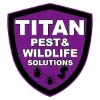Warehouses have unique pest issues and therefore require unique pest control solutions.
Identification and prevention are vital aspects of this equation. Identification refers to noticing the blatant indications of a pest problem. However, prevention refers to regularly scheduled pest control services to prevent pest problems in the first place.
If you manage a warehouse facility and don’t yet have scheduled maintenance, contact Titan Pest & Wildlife Solutions. We provide highly qualified professionals who are thoroughly trained to understand the unique needs of all areas in the warehousing industry.

Discovering a Pest Problem
Certain pests like roaches and rats are well-known and easy to identify. However, other types are relatively unique and can go unnoticed and unreported for a long time. By the time the pest is noticed, considerable damage has already occurred.
Many pests can spread diseases that make employees sick and contaminate goods. Therefore, when a pest problem is discovered, it’s essential to call a warehouse pest control company immediately.
A good thing to remember – if you operate a warehouse, you will have a pest problem at some point. A few ways to combat pest issues is to prevent them in the first place. Another tip is to educate your employees on signs of a pest problem, and not just signs of rodents and roaches, which are relatively easy to identify.
Identifying Unique Warehouse Pests
Many employees aren’t familiar with certain types of pests and the signs of a problem. When a pest issue goes unnoticed, it can wreak havoc on a facility. Some pests unique to the warehouse industry include:
- Indianmeal Moths – It is a two-tone, dark brown insect and one of the world’s most common stored-food pests. The larval form does all the damage and attacks pet food, pasta, bread, seeds, flour, and other foods. It can also easily chew through packaging to get to the food inside.
- Spider beetles – These small beetles are hardy scavengers that feed not only on human foods but also on the feces of other pests. They can pick up Listeria, E. coli, and other bacteria and track them into human food. They get their name from their distinctive round body and long legs, and they can be confused with tiny spiders. Because they don’t look like pests, they may not be recognized as a problem.
- Weevils – Bean, rice, granary, and maize weevils are small beetles that eat various crops and lay their eggs in the seed, categorizing them as agricultural pests. While they’re harmless to humans and can be eaten without harm, consumers are unlikely to be pleased if they find weevils in their products.
- Beetles – Cigarette beetles, flour beetles, drugstore beetles, and the appropriately named warehouse beetle can all infest and contaminate dry foods. After their nickname pantry beetles, these insects are attracted to various grain products, often transported in and out of warehouses. When an employee discovers a small brown or black beetle that doesn’t look like a roach, it may not trigger any alarm bells. But these pests can wreak havoc on a warehouse full of food, costing thousands of dollars in damage.
Warehouses store a vast amount and variety of goods. Pests that get into these stored goods can cause a severe issue. Some of these pests get inside, leaving behind eggs and larvae that will contaminate products. These pests can get into a warehouse on a shipment and multiply quickly, causing an infestation. Educating employees on these different types of pests is essential to discovering a pest problem before it becomes an infestation. This is also why prevention is key!
Pest Prevention is Vital
Prevention is the best warehouse pest control. While there is no foolproof way to prevent pests from entering your warehouse at some point, one way is by keeping your warehouse well maintained and clean to reduce ways for pests to enter in the first place.
At Titan Pest & Wildlife Solutions, we know there aren’t any one-size-fits-all solutions for pests. We customize our plans to the specific requirements of each business and ensure that your needs and expectations are met with care and professionalism.

